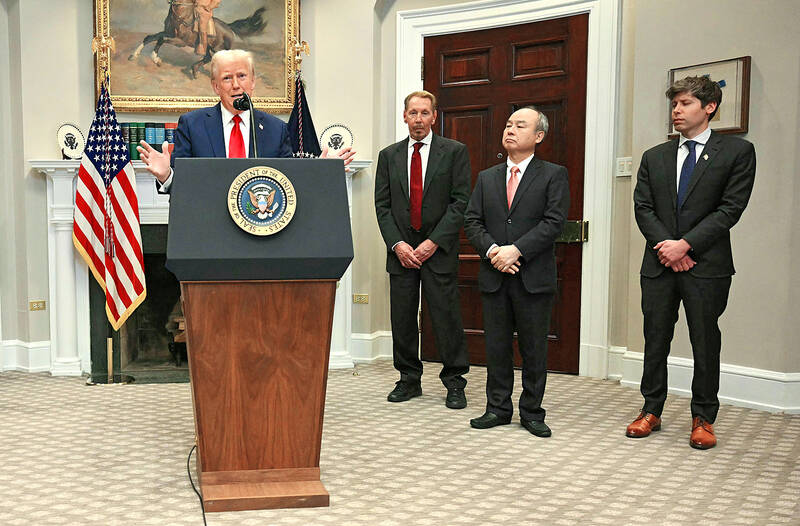US President Donald Trump on Tuesday announced a major investment to build infrastructure for artificial intelligence (AI) led by Japan’s Softbank Group Corp, cloud giant Oracle Corp and ChatGPT-maker OpenAI.
The Stargate AI joint venture “will invest US$500 billion, at least, in AI infrastructure in the United States,” Trump said in remarks at the White House.
“This monumental undertaking is a resounding declaration of confidence in America’s potential,” he said, a day after his swearing-in for a second term.

Photo: AFP
OpenAI chief executive officer Sam Altman, Softbank chief executive officer Masayoshi Son and Oracle founder Larry Ellison attended the announcement.
The companies are committed to investing an initial US$100 billion and up to US$500 billion over the next four years in the project, Son said.
The venture comes as big technology players are scrambling to meet AI’s voracious computing needs, as well as find the electricity necessary to expand the new technology.
Trump said Stargate would be building the physical and virtual infrastructure to power the next generation of advancements in AI, including the construction of “colossal data centers.”
OpenAI later said on social media that the project “will not only support the reindustrialization of the United States but also provide a strategic capability to protect the national security of America and its allies.”
Softbank and OpenAI are the lead partners for Stargate, with Softbank having financial responsibility and OpenAI having operational responsibility, the post said.
MGX, a technology fund from the United Arab Emirates, is a fourth investor, while Arm Holdings PLC, Microsoft Corp, Nvidia Corp, Oracle and OpenAI are the key initial technology partners, it added.
“Build-out is currently underway, starting in Texas, and we are evaluating potential sites across the country for more campuses as we finalize definitive agreements,” OpenAI said.
Softbank shares soared more than 10 percent — leading Tokyo-listed chipmakers higher — after the announcement.
News of the project comes a day after Trump’s inauguration ceremony was attended by prominent technology chiefs, including Apple Inc chief executive officer Tim Cook, Google chief executive officer Sundar Pichai, Meta Platforms Inc chief executive officer Mark Zuckerberg and Amazon.com Inc founder Jeff Bezos.
Trump later on Monday rescinded an executive order from former US president Joe Biden that established oversight measures for companies developing powerful AI models.
Its repeal leaves the US, home to most of the world’s most impactful AI technology, without nationwide AI development guidelines, even if individual states are pursuing their own measures.

Intel Corp chief executive officer Lip-Bu Tan (陳立武) is expected to meet with Taiwanese suppliers next month in conjunction with the opening of the Computex Taipei trade show, supply chain sources said on Monday. The visit, the first for Tan to Taiwan since assuming his new post last month, would be aimed at enhancing Intel’s ties with suppliers in Taiwan as he attempts to help turn around the struggling US chipmaker, the sources said. Tan is to hold a banquet to celebrate Intel’s 40-year presence in Taiwan before Computex opens on May 20 and invite dozens of Taiwanese suppliers to exchange views

Application-specific integrated circuit designer Faraday Technology Corp (智原) yesterday said that although revenue this quarter would decline 30 percent from last quarter, it retained its full-year forecast of revenue growth of 100 percent. The company attributed the quarterly drop to a slowdown in customers’ production of chips using Faraday’s advanced packaging technology. The company is still confident about its revenue growth this year, given its strong “design-win” — or the projects it won to help customers design their chips, Faraday president Steve Wang (王國雍) told an online earnings conference. “The design-win this year is better than we expected. We believe we will win

Chizuko Kimura has become the first female sushi chef in the world to win a Michelin star, fulfilling a promise she made to her dying husband to continue his legacy. The 54-year-old Japanese chef regained the Michelin star her late husband, Shunei Kimura, won three years ago for their Sushi Shunei restaurant in Paris. For Shunei Kimura, the star was a dream come true. However, the joy was short-lived. He died from cancer just three months later in June 2022. He was 65. The following year, the restaurant in the heart of Montmartre lost its star rating. Chizuko Kimura insisted that the new star is still down

While China’s leaders use their economic and political might to fight US President Donald Trump’s trade war “to the end,” its army of social media soldiers are embarking on a more humorous campaign online. Trump’s tariff blitz has seen Washington and Beijing impose eye-watering duties on imports from the other, fanning a standoff between the economic superpowers that has sparked global recession fears and sent markets into a tailspin. Trump says his policy is a response to years of being “ripped off” by other countries and aims to bring manufacturing to the US, forcing companies to employ US workers. However, China’s online warriors